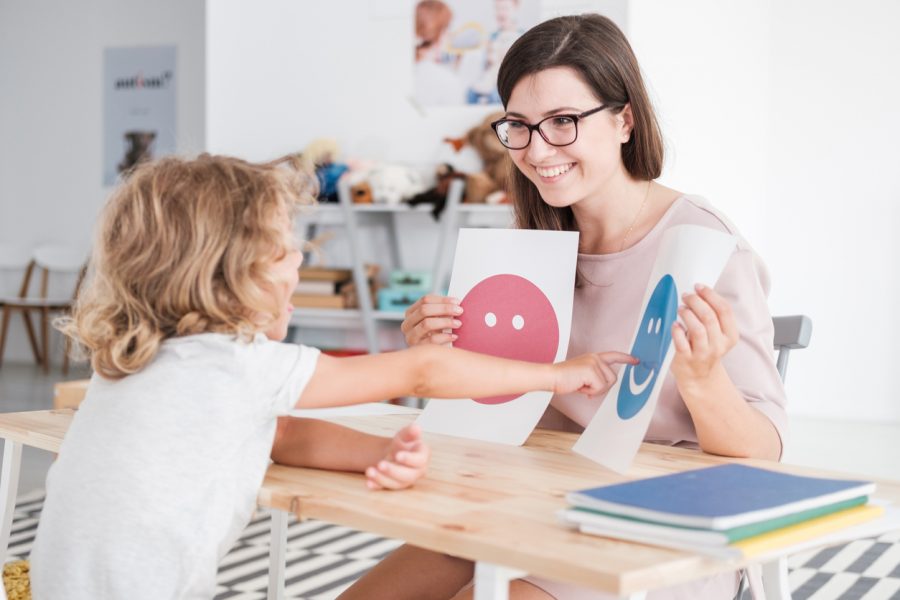
Children, because they are in the process of development, do not benefit from adult-style therapy. They have not yet achieved the ability to communicate their feelings and thoughts through talking only. Instead, special types of counseling activities for children are required.
Counseling activities for children have been created and implemented successfully in counseling for many years. Activities utilize the senses of children, including touch, smell, visual, auditory and even taste. Using the senses allows children to communicate using what they already know.
Keep reading below to learn some effective child counseling activities being used by therapists in this field.
Mindfulness
Mindfulness is important in counseling activities for children because it teaches them awareness of their bodies and minds, and the connection between the two.
Young children can learn to pay attention to what their body is telling them. This is typically called progressive muscle relaxation.
Doing so can help them recognize negative triggers or emotions and make changes early.
Mindfulness activities to try include:
- The Bell Listening Exercise teach them to pay attention to sounds.
- Deep breathing exercises help children learn to relax through breaths.
- Squish and Relax Meditation helps them focus on all body parts, releasing tension in each.
- The Smell and Tell Exercise can use essential oils to help kids concentrate on smells instead of stress.
Because the activities are fun, children do not always realize they are learning and implementing therapeutic techniques.
Art Therapy
Art therapy helps children express themselves when they can not come up with the right words and are limited, simply due to their developmental age, in language.
The benefits of art therapy include:
- Advancing a child’s sensory-motor functions
- Raises a child’s self-esteem when they can see a finished project
- They feel pride and reward at their accomplishment
- Children learn that they can communicate in many different forms
Other art therapy activities use worksheets to help children express themselves. Worksheets are age appropriate and are available for pre-school all the way to high school and beyond.
Emotion Management
Children have emotions, just like the rest of us.
Sometimes children do not know how to express their emotions appropriately. They may be angry but find themselves crying. They may be hurt but become aggressive.
Teaching children what emotions are and how to properly express them is essential in their development. Emotional control is an important trait that can help them throughout life.
Therapists can help children create their own stress balls using balloons and rice. Or, they may create their own emotion doll or emotional color wheels.
There are charts with labeled emotions a therapist will have that allow children to choose the face that matches their feelings.
Just by improving a child’s emotional intelligence, or helping them identify emotions, can offer much improvement in how they react to situations.
Self-Esteem
Building self-esteem in children is one of the best ways to help a child overcome obstacles they may face.
Therapists have tools that enhance self-esteem through developing independence, learning from mistakes, giving back and teaching others, becoming responsible, planning and solving problems.
Other than worksheets, there are many hands-on activities used by counselors to develop self-esteem. Each time a child can decide, or participate in making decisions, they are developing self-esteem. Even if the decision they made is wrong, they can have positive learning experiences.
Therapists can even allow children to take part in planning their therapy sessions, setting the rules for therapy and provide feedback at the end of therapy.
Other activities focus on turning negative self-talk into positive self-talk. Visualization, teaching resilience, rewards for positive behaviors, and learning gratitude can be powerful tools to teach children.
Conflict Resolution
Anger is an emotion that can get out of control quickly if you do not know how to properly cope. Child therapists have many learning experiences to help children learn how to recognize their anger triggers and make decisions on how to respond to anger.
The use of anger management skill cards helps children practice skills for coping with anger. They come with a picture and ideas on how to handle negative emotions.
There are numerous worksheets for teaching conflict resolution, recognizing warning signs and distinguishing between anger and other possible emotions that are often confused with anger, such as fear.
Therapists are also able to implement emotion assessments to evaluate any changes that may be taking place. Children are taught to recognize where and how they feel.
For instance, anger can create stomach aches, headaches, and even rashes.
Family Involvement
Counseling activities for children are wonderful. They should not remain just in the counseling setting, however. Therapists can work with the entire family to implement the techniques learned in therapy in every area of the child’s lifestyle.
Therapists recognize the importance of family involvement. They can help teach all family members how to resolve conflicts both individually and as a group. Families can benefit from helping each other interact positively, building up each other’s self-esteem.
Practicing mindfulness as a family can be a fun way to share in an activity focused on physical, mental and spiritual health. Some group activities for your family to try are:
- Meditation
- Yoga
- Attending spiritual services or retreats
- Exercising and developing a healthy eating plan
- You can provide positive accountability for one another
Attending therapy sessions as a family is beneficial as well. It is in sessions with a counselor that the entire family can learn about emotions and how to manage them properly.
Finding the right therapist for your child’s needs is key to making successful transformations. The right therapist will be trained and have a great deal of experience working with children with the use of age appropriate activities.
A good therapist will have tools that meet your child’s developmental needs, as well as the needs of your family.




